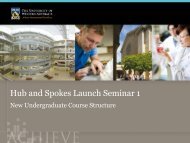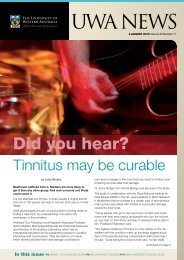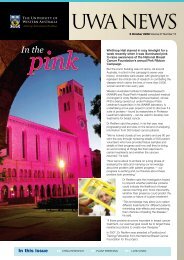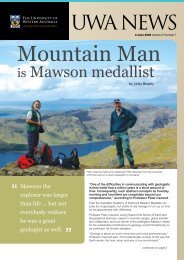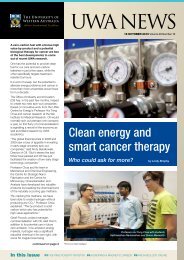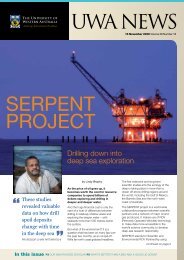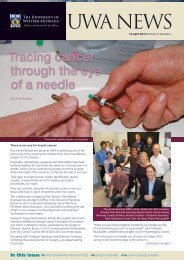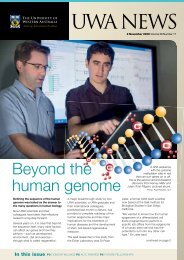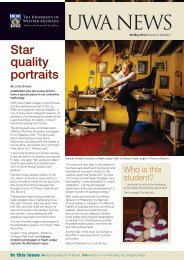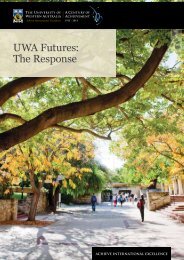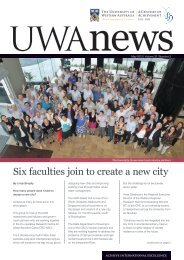Issue 13. 6 September 2010.pdf [PDF File, 1.7 MB] - UWA Staff - The ...
Issue 13. 6 September 2010.pdf [PDF File, 1.7 MB] - UWA Staff - The ...
Issue 13. 6 September 2010.pdf [PDF File, 1.7 MB] - UWA Staff - The ...
Create successful ePaper yourself
Turn your PDF publications into a flip-book with our unique Google optimized e-Paper software.
the last word …<br />
Computers are<br />
about people<br />
“You’re young – you can run the computer labs.”<br />
And so began my career in e-learning when, as a postgrad<br />
student, I was asked by the French Department at <strong>UWA</strong> to<br />
design language lessons for the newly-built Arts Multimedia<br />
Laboratory.<br />
Since that day in 1995 when I struggled to find the ‘on’ switch<br />
on the newest computers, I’ve been on a long journey through<br />
successive generations of digital technology, and I’ve been<br />
privileged to both teach and learn from successive generations<br />
of students as they’ve interacted with the technology. Along<br />
the way I’ve learned a lot about computers – but much more<br />
about people.<br />
As the informational web has morphed into the social web, it’s<br />
become clear that computers, and the internet they give us<br />
access to, are all about people: people communicating with<br />
people, in multiple languages, registers and media. It’s as if<br />
books, magazines, radio and TV have been rolled into one and<br />
the reins handed over to anyone who wants to take them.<br />
We’re no longer limited to reading the words, listening to the<br />
voices, or looking at the videos of the tiny elite who were<br />
traditionally published, recorded and filmed.<br />
But not everyone is happy. We’re told the internet leads to<br />
empty chatter (as we were told, some 150 years ago, about<br />
the telegraph). We’re told it destroys face-to-face relationships<br />
(as we were told, 100 years ago, about the telephone). We’re<br />
told it stultifies thought (as we were told, 50 years ago, about<br />
television).<br />
Everywhere there are politicians, parents and self-appointed<br />
public guardians who want to clamp down on this new medium<br />
in which they themselves are effectively illiterate: to sideline it,<br />
block it, filter it. And everywhere there are young people who<br />
insist on using it anyway: to engage, share and, most of all, to<br />
say what they want to say how they want to say it. Not<br />
everything expressed online is worth hearing. Far from it.<br />
Like pens or cameras, computers can be used to express the<br />
best and the worst of ourselves. But the key word here is<br />
‘express’: each new generation of communications<br />
technologies has given more people more opportunities to<br />
make their voices heard.<br />
Effective self-expression isn’t easy: not in print, not in art, and<br />
certainly not in multiple media spread across networked<br />
environments.<br />
As technologically adept as they sometimes are, today’s youth<br />
still have much to learn, not just about the technology itself, but<br />
about how to interact with, learn from and even teach other<br />
people online – and how to do all of these things safely. <strong>The</strong> net<br />
does have its risks, even if most are digital inflections of<br />
analogue risks that have been around for decades, if not<br />
centuries. That means young people need guidance on many<br />
levels. As a teacher trainer in new technologies, I believe the<br />
greatest gift I can impart to my students is the digital literacy to<br />
support their own present and future students in making the<br />
Mark Pegrum<br />
Assistant Professor Graduate School of Education<br />
best of, and avoiding the worst of, the communicating and<br />
amplifying machine that is the internet.<br />
Not long ago I spoke to one of my former Dip. Ed. students<br />
who’s now teaching English to recent migrants to Australia.<br />
At the same time she’s teaching them language, she’s teaching<br />
them about and through the latest technologies like blogs and<br />
Twitter.<br />
For some of these students, the journey to her classroom<br />
began in the killing fields and refugee camps of their former<br />
homelands. Supported by a dedicated teacher, they’re now<br />
getting the chance to learn, to talk, to write, to express<br />
themselves. One of these days, they’ll have both the language<br />
and the technology to get their messages out to whoever wants<br />
to listen. I wonder what they’ll have to say?<br />
<strong>UWA</strong> NEWS<br />
EDITOR/WRITER: Lindy Brophy, Public Affairs<br />
Tel: 6488 2436 Fax: 6488 1020<br />
Email: lindy.brophy@uwa.edu.au<br />
Hackett Foundation Building, M360<br />
Director of Public Affairs: Doug Durack<br />
Tel: 6488 2806 Fax: 6488 1020<br />
Designed and printed by UniPrint, <strong>UWA</strong><br />
<strong>UWA</strong>news online: http://uwanews.publishing.uwa.edu.au/<br />
UniPrint 80757<br />
16<br />
<strong>UWA</strong> NEWS 6 <strong>September</strong> 2010<br />
<strong>The</strong> University of Western Australia


![Issue 13. 6 September 2010.pdf [PDF File, 1.7 MB] - UWA Staff - The ...](https://img.yumpu.com/26619782/16/500x640/issue-13-6-september-2010pdf-pdf-file-17-mb-uwa-staff-the-.jpg)
